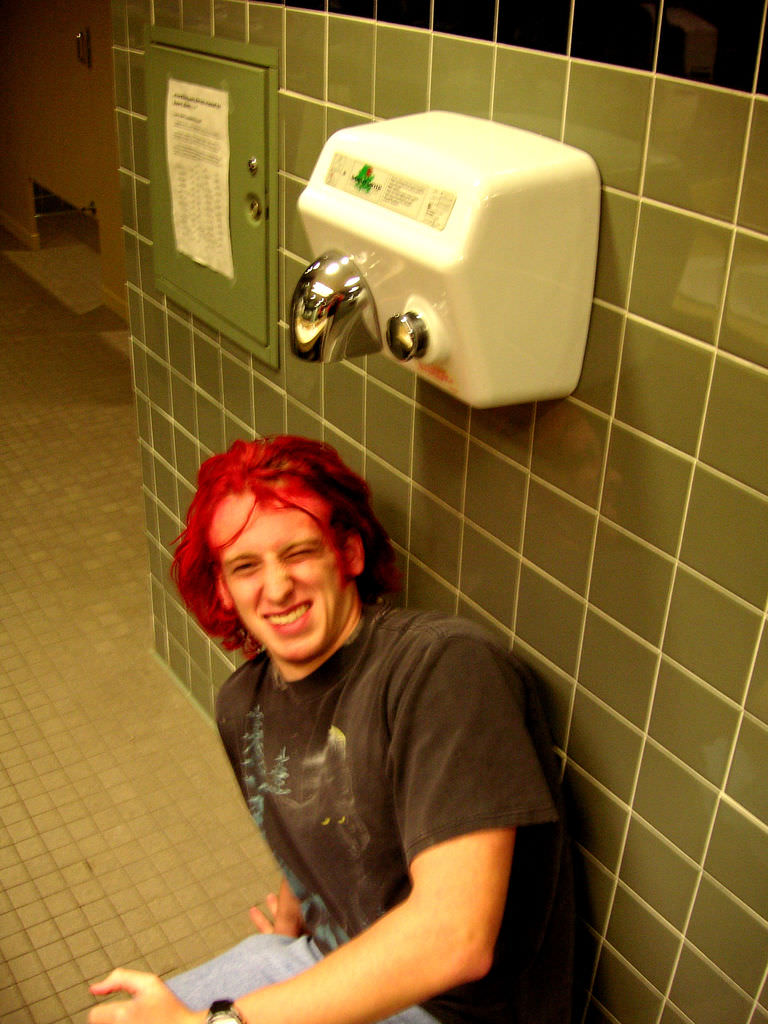 The debate over whether bathroom hand dryers or paper towels are more sustainable and hygienic has never been clearly won by either side.((https://www.sciencealert.com/the-great-bathroom-debate-paper-towel-or-hand-dryer))((https://www.washingtonpost.com/blogs/compost/wp/2012/12/14/the-paper-towel-hand-dryer-wars-are-over/?noredirect=on&utm_term=.0fd667fe354a)) Now a new concern has emerged.
The debate over whether bathroom hand dryers or paper towels are more sustainable and hygienic has never been clearly won by either side.((https://www.sciencealert.com/the-great-bathroom-debate-paper-towel-or-hand-dryer))((https://www.washingtonpost.com/blogs/compost/wp/2012/12/14/the-paper-towel-hand-dryer-wars-are-over/?noredirect=on&utm_term=.0fd667fe354a)) Now a new concern has emerged.
According to a new study conducted at the University of Connecticut, electric hand dryers actually spread fecal matter in public restrooms.
When you flush a toilet with the lid up, tiny particles of water droplets are released into the air. It’s called a toilet plume.
Mythbusters proved there is fecal matter on your toothbrush from toilet plumes:
Explanation: Every time you flush a toilet, it releases an aerosol spray of tiny tainted water droplets. So if, like many people, you leave your toothbrush in the vicinity of a toilet, does that mean it’s regularly bathed in bits of fecal matter? MythBusters Jamie Hyneman and Adam Savage uncovered the dirty truth to this myth by covering a bathroom with 24 toothbrushes, two of which they brushed with each morning — the others they simply rinsed every day for a month…
Astonishingly, all the toothbrushes were speckled with microscopic fecal matter, including the ones that had never seen the inside of a bathroom.
Now imagine a public restroom with many toilets releasing human waste bacteria into the air. Electric hot hand dryers disperse this fecal matter on to wet hands and into the air. They may also be reservoirs for collecting the bacteria. Published in Applied and Environmental Microbiology researchers conclude from their study:
These results indicate that many kinds of bacteria, including potential pathogens and spores, can be deposited on hands exposed to bathroom hand dryers, and that spores could be dispersed throughout buildings and deposited on hands by hand dryers.((http://aem.asm.org/content/early/2018/02/05/AEM.00044-18.abstract))
The Independent describes how the research was conducted using plates:
The plates that were exposed to hand dryer air for 30 seconds collected approximately 18 to 60 colonies of bacteria, while the plates that were simply placed in a bathroom while a fan restributed air for 20 minutes collected an average of 15 to 20 colonies of bacteria.
The researchers concluded that fitting hand dryers with HEPA (high efficiency particulate air) filters could reduce the amount of bacteria distributed by hand dryers. ((https://www.independent.co.uk/life-style/health-and-families/hand-dryers-poo-particles-human-waste-spread-you-bathroom-study-america-a8301141.html?utm_campaign=Echobox&utm_medium=Social&utm_source=Facebook))
Some hand dryers like those made by Dyson do use HEPA filters. In fact, the company marketed their Airblade hand dryers as reducing the potential risk for electric hand dryers to disperse fecal matter.((https://www.independent.co.uk/news/science/james-dyson-takes-on-the-taboo-of-toilet-plume-10318521.html)) Unfortunately, the researchers at the University of Connecticut found even air dyers with HEPA filters collected human waste bacteria.
Paper towels or the electric hand dryer? It may be best to simply avoid public restrooms in general when possible. It’s not just the toilet seat or floor where bacteria is lurking.
Image: Nelson Pavlosky on Flickr CC BY-SA 2.0
Leave a Reply